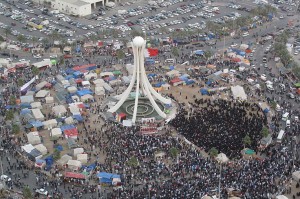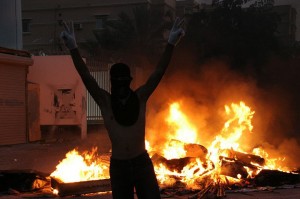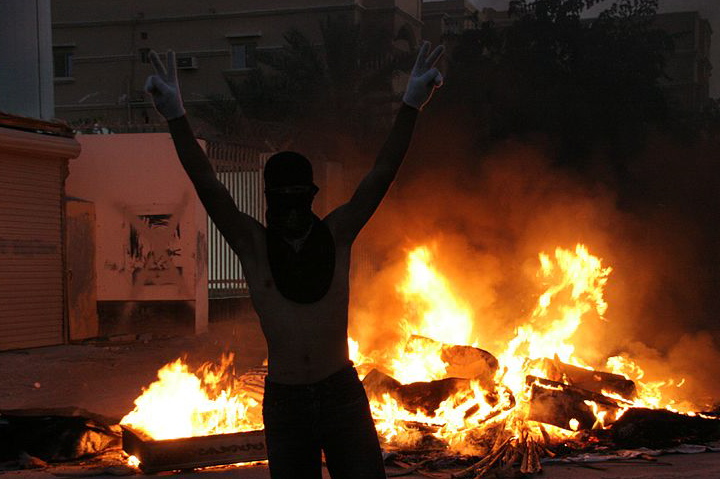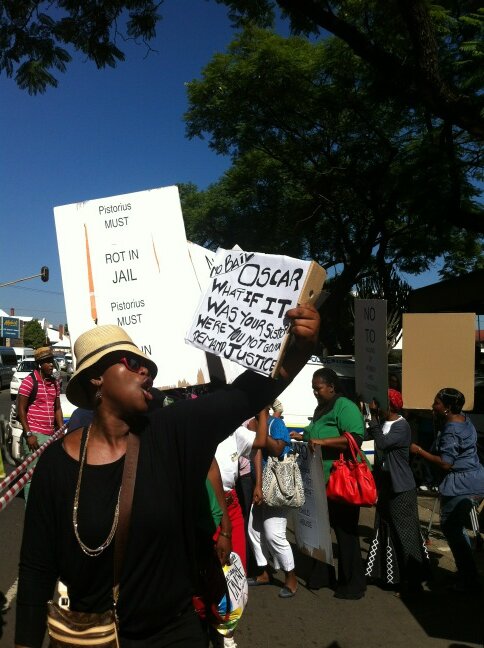The Pearl Monument may be just dirt now but a year on, since the spontaneous protests began in Bahrain, not much has changed. The first anniversary of the uprising has ended as it began.
Thousands of protesters tried to march to the former site of the Pearl Monument, but were met by police blocking their way, firing tear gas and stun grenades. Despite this, protesters have vowed to reoccupy the area to mark the anniversary.
The movement, inspired by the Tunisian and Egyptian revolutions, embraced people from both the majority Shi’ite community as well as Sunnis, cutting across class and religious divides, with demands for political, social and economic reform. The protests accused the Sunni monarchy of discrimination in housing, education and employment, and called for justice.
After bloody clashes, protesters seized a landmark known as Pearl Roundabout, where they stayed for weeks in tents. But in March, King Hamad bin Isa al-Khalifa sought assistance from Saudi Arabia, which sent in 1,200 troops, and the uprising was crushed, with widespread arrests. The crackdown resulted in more than 30 demonstrators’ deaths.
After forcibly removing the protesters’ tent city, the government destroyed a 300-foot sculpture topped by a giant pearl.

The crackdown won a tactical and brief victory through torture, arrests and job dismissals. Many of those who have been allowed to go back to their jobs have been asked to sign statements saying that they will not protest again and some were put under pressure to give up trade unionism activities. In addition to this some have been asked to perform different jobs and functions from their original work.
Since then, Bahrain has been referred to as a police state. Emergency laws gave the security forces the right to search houses at will without a warrant and dissolve any organisation, including legal political parties, that were deemed a danger to the state. Even two members of the national football team were arrested, despite apologising on television for attending anti-government rallies.
Although the king ended the country’s state of emergency on 1 June, the situation remained tense, with security checkpoints and a heavy police presence around the country. Opposition groups in a joint statement called the police reaction ‘hysterical’ saying security forces attacked women, children and clerics, all who were badly beaten.
Even though Bahrain is a very small nation-state, it still hosts a divided population. The split is between approximately 70 per cent Shi’ite and 30 per cent Sunni. As in several states in the region, the majority is Shi’ite, while the ruling class is Sunni.
In recent weeks, small-scale protests in Shi’ite villages and on the outskirts of Manama have increasingly ended in violence with both security forces and protesters blaming each other.
Last Spring, the monument saw hundreds of thousands making a protest camp before it was demolished by Saudi-backed troops. The site – renamed Martyrs’ Square by protesters in memory of those killed in the repression – was intended to be reclaimed by demonstrators this week to mark the anniversary of the uprising.
The day before the anniversary, the Al Khalifa rulers warned “those who would take Bahrain back into a dark tunnel” would not be tolerated. The foreboding language was reminiscent of that used last year to describe largely peaceful protests before a three-month ‘State of Emergency’ that was invoked on 15 March. Which was followed within hours by the lethal invasion of Saudi-led troops and massive detention of people swept up in raids on Shia villages and districts of the capital.
Armored vehicles patrolled Bahrain’s capital on Tuesday in a security clampdown to deter protesters after overnight clashes outside Manama happened on the first anniversary of a forcibly suppressed pro-democracy uprising.

Youths flung petrol bombs at police cars prompting authorities to flood Shi’ite villages around Manama with police reinforcements backed by helicopters. The events of 14 February have succeeded in drawing valuable media attention.
Police fired tear gas at two dozen protesters near the former Pearl Roundabout nearly hitting several people as canisters bounced off cars.
The re-emergence of armored personnel carriers for the first time since martial law was lifted in June underlined the concerns of the Sunni Muslim-led monarchy about a new explosion of civil unrest by Bahrain’s disgruntled Shi’ite majority.
Troops and police have saturated the area over the past few days and were reported to have opened fire on cars and pedestrians as they made their way to the site. Large parts of Manama have also been sealed off to prevent people reaching the site of the now demolished Pearl Roundabout. There appears to be a concerted effort by the regime to escalate the violence in order to justify calling another ‘State of Emergency’.
One year on, it seems that the Bahraini regime is intent on using the same tactics to derail legitimate demands for democracy on the island, where the Al Khalifa family has ruled as an unelected dynasty since nominal independence from Britain in 1971.
Since late 2009, Shi’ites in villages around the nation have been holding regular protests, burning tires in the road and demanding the release of dozens of political prisoners.
In a televised speech on Monday, King Hamad bin Isa Al Khalifa told Bahrainis that he remained committed to the reform process, adding that it “marked the launch of a development and modernisation process, which is still moving forward to meet the aspirations of our loyal people in all areas.” He also said he had pardoned 291 prisoners.
The opposition dismissed the reform process as cosmetic, pointing out that the released prisoners did not include those who were detained during last year’s revolt.
No one can stop this revolution, the dictators continue to show that they will never change. And the people will never stop fighting for the rights, to remove dictators who are not worthy of ruling their country especially when the people feel that they can do it themselves.







Comments are closed.